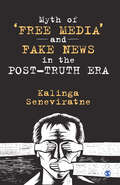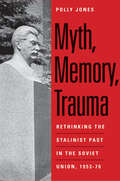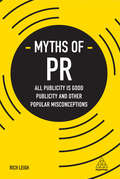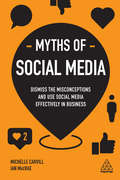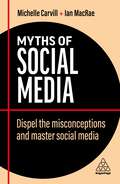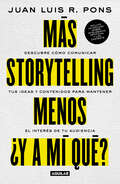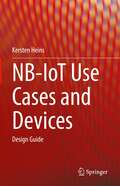- Table View
- List View
My Twentieth Century Evening and Other Small Breakthroughs: The Nobel Lecture
by Kazuo IshiguroThe Nobel Lecture in Literature, delivered by Kazuo Ishiguro (The Remains of the Day and When We Were Orphans) at the Swedish Academy in Stockholm, Sweden, on December 7, 2017, in an elegant, clothbound edition. In their announcement of the 2017 Nobel Prize in Literature, the Swedish Academy recognized the emotional force of Kazuo Ishiguro’s fiction and his mastery at uncovering our illusory sense of connection with the world. In the eloquent and candid lecture he delivered upon accepting the award, Ishiguro reflects on the way he was shaped by his upbringing, and on the turning points in his career—“small scruffy moments . . . quiet, private sparks of revelation”—that made him the writer he is today. With the same generous humanity that has graced his novels, Ishiguro here looks beyond himself, to the world that new generations of writers are taking on, and what it will mean—what it will demand of us—to make certain that literature remains not just alive, but essential. An enduring work on writing and becoming a writer, by one of the most accomplished novelists of our generation.
My Vast Fortune
by Andrew Tobias"This book will make you rich. Filthy stinking rich. You will never need to work again. You will spend the rest of your life on the Riviera sipping piña coladas and listening to Sinatra. And even if this doesn't happen, Andrew Tobias will provide you with such a wealth of wit that you will retire with a vast fortune of laughter. "--Christopher Buckley, author of Wry MartinisAs Newsweek put it, "Andrew Tobias remains the funniest of the financial writers." Forbes identified him as "one of the financial community's most pithily perceptive observers." In My Vast Fortune, the bestselling author of The Only Investment Guide You'll Ever Need tells the amusing and illuminating story of how he amassed dizzying (well, to him) wealth. Then, he describes the unusual ways he's put it to work. Among his more famous money adventures are:His personal campaign against smoking in Russia, which began when he spotted an opportunity to buy cheap TV airtime for commercials. "Excuse my pronunciation, " he told ninety million Russians night after night, "but I have something important to tell you."His decision to buy real estate in Miami over the phone, without ever seeing it. For the price of a swank two-bedroom apartment in New York, Tobias realized he could buy most of a neighborhood--so he did. Oops. The tragicomic story of liberal as slumlord.His crusade to fix the auto insurance mess, which pitted him against--of all people--his onetime hero Ralph Nader. After spending $250,000 of his vast fortune on a referendum in California (where he has never lived), Tobias came to two conclusions: 1) "Each of us has a calling and--though appallingly boring--auto insurance seemed more and more to be mine" ; and 2) "Ralph Nader is a big fat idiot." Finally, Tobias addresses your vast fortune and offers his wisest tips on how to make it and how to spend it. Witty and compassionate, Andrew Tobias is a plutocrat for the nineties, a capitalist with a heart. If you enjoyed The Only Investment Guide You'll Ever Need, you'll love My Vast Fortune.From the Hardcover edition.
My War
by Andy RooneyMy War is a blunt, funny, idiosyncratic account of Andy Rooney's World War II. As a young, naïve correspondent for The Stars and Stripes, Rooney flew bomber missions, arrived in France during the D-Day invasion, crossed the Rhine with the Allied forces, traveled to Paris for the Liberation, and was one of the first reporters into Buchenwald. Like so many of his generation, Rooney's life was changed forever by the war. He saw life at the extremes of human experience, and wrote about what he observed, making it real to millions of men and women. My War is the story of an inexperienced kid learning the craft of journalism. It is by turns moving, suspenseful, and reflective. And Rooney's unmistakable voice shines through on every page.
My Way or the Highway: The Micromanagement Survival Guide
by Harry E. ChambersWhat to do when you are micromanaged, and how to avoid becoming a micromanager.
My World in Motion
by Jo WhileyJo Whiley is someone millions of us recognise but very few of us know. Jo's a mother, sister, DJ, wife and music-industry insider who throughout her career - and in an age of fleeting celebrity - has earned the respect of her peers and fans by simply being herself and for her constant enthusiasm, be it for established rock 'n roll royalty or emerging talent. For Jo Whiley, it's all about the music.My World in Motion offers a unique opportunity to get to know the real Jo Whiley. From her musical epiphany (being carried over the crowd at a Clash concert) to when she became friends with John Peel at Glastonbury (over some very short shorts - his not hers) and interviewed Bono (surviving a power-cut on vodka). My World in Motion is an honest, funny, self-deprecating account of Jo's professional coming of age, and what it means to be a private person in a very public world.
My Year Off
by Robert Mccrum'When I was just forty-two I suffered a severe stroke. Paralysed on my left side and unable to walk, I was confined to hospital for three months, then spent about a year recovering, slowly getting myself back into the world. When I was seriously ill in hospital, I longed to read a book that would tell me that I might expect in convalescence and also give me something to think about. . . ' 'Not only a riveting account of his sudden illness, but of love being put under a real test: a heart-warming triumph' Kazuo Ishiguro, Sunday Times Books of the Year 'With its lucid heartfelt prose, My Year Offgives voice to the millions of people who suffer strokes . . . More importantly, this book is a testament to the parallel trials and courage of the family members of stroke victims' New York Times Book Review 'Few of us can write in perfect health with the wit, skill, honesty and compassion that McCrum manages following a stroke' Professor Anthony Clare
My personal Adaptive Global NET (MAGNET)
by Ramjee PrasadThe innovative concept of Personal Network (PN), which was introduced and developed in MAGNET, finds in this book the first confirmation of the success that the future of wireless communications is bound to achieve. The importance of this book is not only related to being the first work on PNs, it also gives an overview of operation of a big project, like MAGNET, and in fact the organisation of the book reflects how the project itself has been structured. My personal Adaptive Global NET (MAGNET) summarize all the steps taken from the introduction of a user-centric perspective until the implementation of PN-Fs (Federation of Personal Networks), outlining the applications and commercialisations of the new concepts carried out of the project. The intent of My personal Adaptive Global NET (MAGNET) is to disseminate the concept of PN and PN-F along with the activities and achievement carried out in MAGNET/MAGNET Beyond to encourage new project and academic initiatives toward personalized, ubiquitous communications.
MySpace for Moms and Dads: A Guide to Understanding the Risks and the Rewards
by Connie NealYou can't ignore MySpace if you're a parent-but you don't have to be intimidated by it. This simple, step-by-step exploration of what MySpace means in your teen's life helps even computer-challenged parents and grandparents understand this communication revolution and make informed, confident decisions about their teen's use of MySpace.
MySpace to Sacred Space: God for a New Generation
by Christian Piatt Amy PiattRecently, MySpace.com has become one of the most-visited Web sites in the world. With millions of young users, this one site has made a giant impact on youth pop culture in just a matter of a few years. At the same time, themes of spirituality pervade our lives. From television to film and popular literature, theology is a burgeoning enterprise in popular culture. In contrast, most churches and denominations are built on eighteenth-century principles, and are fighting to remain relevant to young members. The collective fear is that if the church doesn't adapt to this new generation, they will be left behind forever. Christian and Amy Piatt believe church leaders have a responsibility to stay tuned in to the values and vernacular employed by the younger generations. MySpace to Sacred Space combines first-hand accounts with case studies from people both within and outside the church. Far from tolling the death knell for the established church, MySpace to Sacred Space is an affirming, hopeful look at the ever-growing need for what the Christian faith can offer the world. Much of the relevance for the twenty-first century church can be found in our oldest traditions. By reconnecting with our past and by setting time aside for God and for one another, we have an opportunity to create sacred space and time wherever we are.
Myth of ‘Free Media’ and Fake News in the Post-Truth Era
by Kalinga SeneviratneMyth of ‘Free Media’ and Fake News in the Post-truth Era reveals the story of ‘fake news’ hysteria and myth of ‘free media’ in the post-truth world order, starting from the question of whether there has really been a ‘truth’ era. The book examines how the news media is battling for relevance in the age of Internet. It shows how the wave of media ‘liberalization’ has weakened the basic premise of Libertarian Media Function Theory, which states that the media is the ‘Fourth Estate’ that protects the citizens from abuse of power by the government. It analyses how excessive commercialization of the media and the commodification of news has changed journalism globally. The book recommends a new paradigm and explains how it can be used to transform news reporting from an adversarial model to a human-centric one.
Myth, Memory, Trauma
by Polly JonesDrawing on newly available materials from the Soviet archives, Polly Jones offers an innovative, comprehensive account of de-Stalinization in the Soviet Union during the Khrushchev and early Brezhnev eras. Jones traces the authorities' initiation and management of the de-Stalinization process and explores a wide range of popular reactions to the new narratives of Stalinism in party statements and in Soviet literature and historiography. Engaging with the dynamic field of memory studies, this book represents the first sustained comparison of this process with other countries' attempts to rethink their own difficult pasts, and with later Soviet and post-Soviet approaches to Stalinism.
Myth: Folklore, legends and fables from around the world
by Sarah BartlettHumans have always told stories, and myths have been used for millennia as a means of storytelling. A good tale can deliver an important message, an understanding of deeper emotional conflicts, or perhaps act as a light piece of entertainment. Myths have always been a useful lens to see reality through, as well as granting explanations for the unexplainable. Myth provides detailed information on a wide range of myths and legends throughout history and across the globe. Ancient myths of Egypt, Rome, Greece, Scandinavia and the Celtic world are explored alongside the legends of Native Americans, Australian Aborigines, Aztecs and Incas, Africa and Asia. From Aphrodite to King Arthur and the Epic of Gilgamesh to Mayan death gods, here you will find a guide to the specific traditions as well as an exploration of common themes in myths worldwide including creation, love, quests and the underworld.This is an indispensable guide for any mythology enthusiasts.
Myth: Folklore, legends and fables from around the world
by Sarah BartlettHumans have always told stories, and myths have been used for millennia as a means of storytelling. A good tale can deliver an important message, an understanding of deeper emotional conflicts, or perhaps act as a light piece of entertainment. Myths have always been a useful lens to see reality through, as well as granting explanations for the unexplainable. Myth provides detailed information on a wide range of myths and legends throughout history and across the globe. Ancient myths of Egypt, Rome, Greece, Scandinavia and the Celtic world are explored alongside the legends of Native Americans, Australian Aborigines, Aztecs and Incas, Africa and Asia. From Aphrodite to King Arthur and the Epic of Gilgamesh to Mayan death gods, here you will find a guide to the specific traditions as well as an exploration of common themes in myths worldwide including creation, love, quests and the underworld.This is an indispensable guide for any mythology enthusiasts.
Myths of PR: All Publicity is Good Publicity and Other Popular Misconceptions
by Rich LeighMyths of PR: All Publicity is Good Publicity and Other Popular Misconceptions uses popular myths about the theory and practice of public relations as a vehicle for helping startup owners, brand marketers, communications practitioners and students to distinguish between fads and tried-and-tested PR practice. Its purpose is to shatter widespread misconceptions about PR, and grant readers insights into why these myths have endured in spite of clearly demonstrable evidence to the contrary.By exploring topics that readers will relate to (though many might frequently misunderstand), Myths of PR will shed new light on essential PR methodology. From the assumption that PR is a never-ending party, propagated by the way the industry is shown in the media and entertainment, to more potentially damaging misconceptions such as the often-repeated 'all publicity is good publicity', it is an engaging, anecdotal read that offers authentic insights into the reality of PR practice from one of the brightest and most exciting young communication experts in the UK.
Myths of Social Media: Dismiss the Misconceptions, Side-step the Slip-ups and Use Social Media Effectively in Business (Business Myths)
by Michelle Carvill Ian MacRaeEveryone knows that social media is free, millennials are all adept social media experts, that businesses always have to be available 24/7 and ultimately none of it really matters, as the digital space is full of fake news and online messaging is seen as inauthentic. Don't they?The use of social media as a business tool is dominated by falsehoods, fictions and fabrications. In Myths of Social Media, digital consultant Michelle Carvill and workplace psychologist Ian MacRae dismiss many of the most keenly-held misconceptions and instead, present the reality of social media best practice. Using helpful and instructive, sometimes entertaining and occasionally eye-watering examples of what you should and should not do, Myths of Social Media debunks the most commonly held myths and shows you how to use social media effectively for work and at work.
Myths of Social Media: Dispel the Misconceptions and Master Social Media (Business Myths)
by Michelle Carvill Ian MacRaeEveryone knows that social media is free, millennials are all adept social media experts, that businesses always have to be available 24/7 and ultimately none of it really matters, as the digital space is full of fake news and online messaging is seen as inauthentic. Don't they?The use of social media as a business tool is dominated by falsehoods, fictions and fabrications. In Myths of Social Media, digital consultant Michelle Carvill and workplace psychologist Ian MacRae dismiss many of the most keenly-held misconceptions and instead, present the reality of social media best practice. Using helpful and instructive, sometimes entertaining and occasionally eye-watering examples of what you should and should not do, Myths of Social Media debunks the most commonly held myths and shows you how to use social media effectively for work and at work.About the Business Myths series... The Business Myths series tackles the falsehoods that pervade the business world. From leadership and management to social media, strategy and the workplace, these accessible books overturn out-of-date assumptions, skewer stereotypes and put oft-repeated slogans to the test. Entertaining and rigorously researched, these books will equip you with the insight and no-nonsense wisdom you need to succeed.
Myths, Lies, and Downright Stupidity: Get Out the Shovel - Why Everything You Know is Wrong
by John StosselStossel explains that much of what we hear, and what the media say, are myths. And he backs it up.
Más allá del sí: Un método para superar el autosabotaje y negociar con éxito
by Erica Ariel FoxNegociar con eficacia es crucial para dirigir con inteligencia y ser feliz. Cómo dejar de ser su propio peor enemigo en las negociaciones y en la vida. Liderar y vivir implica estar negociando continuamente y emplear una estrategia con la que ambas partes salgan ganando. Sin embargo, tradicionalmente hemos soslayado el hecho de que las negociaciones que más impacto tienen en nuestra capacidad de liderar son las que mantenemos con nosotros mismos. ¿Qué significa «negociar con uno mismo»? Es lo que ocurre cuando usted quiere seguir trabajando pero al mismo tiempo desearía cumplir su promesa de cenar con la familia; o cuando una parte de usted quiere darle una nueva oportunidad a una relación, mientras la otra sabe a ciencia cierta que ha llegado el momento de decir adiós. Más allá del sí le ofrece una hoja de ruta para negociar con usted mismo, echar mano de la sabiduría innata que reside en su interior y aclarar sus ideas. Tanto si tiene problemas con un cliente complicado como si ha surgido una pequeña discrepancia con su cónyuge, cuando comprenda y domine lo que Erica Ariel Fox llama sus «negociadores internos», será capaz de superar rupturas y llegar a acuerdos, controlando a su peor enemigo: usted mismo Reseñas:«Erica Ariel Fox ha creado unas herramientas imaginativas y novedosas para ayudarle a controlar su mundo interior. Más allá del sí es la llave para una vida mejor.»Daniel Goleman, autor del best seller Inteligencia emocional «Erica Ariel Fox ha conseguido integrar de forma innovadora el cambio personal con herramientas prácticas para liderar y negociar. Su nuevo método tendrá un impacto tanto en el trabajo como en casa.»Deepak Chopra, autor de El alma del liderazgo «Sencillamente, Erica es una de las mejores maestras de liderazgo de nuestros tiempos. Su libro le cambiará la vida, como cambió la mía.»Nate Boaz, socio de McKinsey & Company
Más storytelling, menos ¿y a mi qué?: Descubre como comunicar tus ideas y contenidos para mantener el interés de tu audiencia
by Juan Luis R. Ponscomunicarte de forma clara y efectiva es más crucial que nunca Te ha pasado que alguien te cuenta algo y que lo único que te viene a la cabeza es: “¿Y A MÍ QUÉ?”. Bueno, no permitas que le suceda así a tu audiencia cuando comuniques tus ideas o contenidos. Lo que tú quieres es conectar a nivel emocional, que lo que digasles importe y que mantenga su atención. ¿Cuál es el secreto? Entender qué es ESO que responderá al “¿Y A MÍ QUÉ?” de la gente que te escucha. Los principios que encierra esta poderosa frase son la clave para no solo contar historias, sino enamorar a tu audiencia con ellas. Este libro te dará la confianza para estructurar y comunicar tus ideas y contenidos de forma clara, efectiva y memorable. Aprenderás cómo llevar tu storytelling al siguiente nivel, para que tus ideas impacten emocionalmente en quien más te importa. “Nunca había recibido un asesoramiento tan contundente y tan orientativo. Fue básico que estuviese Juan Luis al lado mío, incitándome a que me soltara, a que fuese yo al comunicar. Así como en su momento tuve entrenadores y directivos que me ayudaron en mi carrerao asesores en cuanto al tema de inversiones, Juan Luis me guio en esta faceta que era nueva para mí. Me apoyó mucho en estructurar lo que pensaba y traducirlo en palabras para convencer y conseguir algo importante. Gracias a eso no me resultó difícil; se me hizo hasta sencillo”.—HUGO SÁNCHEZ, el mejor jugador en la historia de México. “Fue increíble trabajar con Juan Luis. Fue muy puntual en las cosas que hay que tener presente [al hablar en público]: cómo ser contundente, qué tan larga debe ser cada oración y cómo dejar un mensaje preciso. Todos esos tips hicieron que mi mensaje fuera perfecto. Eso lo hace un gran profesional en su área: la comunicación de cualquier tipo, ya sea un video, una grabación, un documental o un libro”.—LORENA OCHOA, golfista número 1 del mundo por cuatro temporadas consecutivas. “Crecí muchísimo como conferencista al trabajar con Juan Luis. La diferencia fue radical. Sabe perfecto qué pregunta hacerte para indagar en eso quequieres comunicar y te entrena para que no pierdas la atención del público y que tu comunicación sea eficiente e interesante”. —OLIVIA PERALTA, empresaria, autora y presentadora de televisión. “Si quieresaprender sobre escucha activa, cómo elaborar preguntas profundas y cómo organizar la comunicación de tus ideas para que sea efectiva, no te puedes perder este libro”. —LEON KRAIG, exCEO Mars México y expresidente Mars Pet Care LatAm.
México dividido
by Ricardo HomsUn libro que aborda el análisis de la identidad del mexicano a partir del impacto cultural de la globalización en el estilo de vida de las nuevas generaciones, la conformación de los nuevos modelos aspiracionales, los nuevos valores morales y el impacto de las tecnologías en la conducta cotidiana desde la perspectiva de un pasado descrito con falta de veracidad.La globalización está poniendo en evidencia rasgos de identidad de una idiosincrasia compleja que hoy está frenando el desarrollo de la sociedad mexicana. La globalización hoy es una vitrina en tiempo real que nos exhibe en alta definición.Se percibe fuerte presión de la cultura global hacia quienes habitamos nuestro país, fenómeno que provoca un choque de valores que ha impactado nuestra estructura social, generando nuevas conductas que antes eran desconocidas. Por ello se hace necesario recurrir al análisis de nuestra idiosincrasia para identificar el punto de encuentro que nos permita convivir con el resto del mundo sin perder nuestra individualidad.Divided MexicoA book that addresses the analysis of Mexican identity from the cultural impact of globalization on the lifestyle of new generations, the conformation of new aspirational models, new moral values and the impact of technologies on daily behavior from the perspective of a past described with a lack of veracity.Globalization is revealing identity traits of a complex idiosyncrasy that today is holding back the development of Mexican society. Globalization today is a real time showcase that exhibits us in high definition.We perceive strong pressure from the global culture towards those who live in our country, a phenomenon that provokes a clash of values that has impacted our social structure, generating new behaviors that were previously unknown. Therefore, it is necessary to analyze our idiosyncrasy in order to identify the meeting point that allows us to coexist with the rest of the world without losing our individuality.
México dividido
by Ricardo HomsUn libro que aborda el análisis de la identidad del mexicano a partir del impacto cultural de la globalización en el estilo de vida de las nuevas generaciones, la conformación de los nuevos modelos aspiracionales, los nuevos valores morales y el impacto de las tecnologías en la conducta cotidiana desde la perspectiva de un pasado descrito con falta de veracidad.La globalización está poniendo en evidencia rasgos de identidad de una idiosincrasia compleja que hoy está frenando el desarrollo de la sociedad mexicana. La globalización hoy es una vitrina en tiempo real que nos exhibe en alta definición.Se percibe fuerte presión de la cultura global hacia quienes habitamos nuestro país, fenómeno que provoca un choque de valores que ha impactado nuestra estructura social, generando nuevas conductas que antes eran desconocidas. Por ello se hace necesario recurrir al análisis de nuestra idiosincrasia para identificar el punto de encuentro que nos permita convivir con el resto del mundo sin perder nuestra individualidad.Divided MexicoA book that addresses the analysis of Mexican identity from the cultural impact of globalization on the lifestyle of new generations, the conformation of new aspirational models, new moral values and the impact of technologies on daily behavior from the perspective of a past described with a lack of veracity.Globalization is revealing identity traits of a complex idiosyncrasy that today is holding back the development of Mexican society. Globalization today is a real time showcase that exhibits us in high definition.We perceive strong pressure from the global culture towards those who live in our country, a phenomenon that provokes a clash of values that has impacted our social structure, generating new behaviors that were previously unknown. Therefore, it is necessary to analyze our idiosyncrasy in order to identify the meeting point that allows us to coexist with the rest of the world without losing our individuality.
NAB Legal Guide to Broadcast Law and Regulation
by Jean Benz Jane E. Mago Jerianne TimmermanTo guide the industry in the 21st century, counsel for the National Association of Broadcasters (NAB) and leading attorneys have prepared the only up-to-date, comprehensive broadcast regulatory publication: NAB’s Legal Guide to Broadcast Law and Regulation. Known for years as the "voice" for broadcast law, this publication addresses the full range of FCC regulatory issues facing radio and television broadcasters, as well as intellectual property, First Amendment, cable and satellite, and increasingly important online issues. It gives practicing attorneys, in-house counsel, broadcasters and other communications industry professionals practical "how to" advice on topics ranging literally from "a" (advertising) to "z" (zoning). Now in its 6th edition, NAB’s Legal Guide to Broadcast Law and Regulation is available to keep you current on changes in the law, significant court decisions, FCC rules, agency policies and applied solutions. The National Association of Broadcasters is a nonprofit trade association that advocates on behalf of local radio and television stations and broadcast networks before Congress, the Federal Communications Commission and other federal agencies, and the courts.
NB-IoT Use Cases and Devices: Design Guide
by Kersten HeinsThis book presents the cellular wireless network standard NB-IoT (Narrow Band-Internet of Things), which addresses many key requirements of the IoT. NB-IoT is a topic that is inspiring the industry to create new business cases and associated products. The author first introduces the technology and typical IoT use cases. He then explains NB-IoT extended network coverage and outstanding power saving features which are enabling the design of IoT devices (e.g. sensors) to work everywhere and for more than 10 years, in a maintenance-free way. The book explains to industrial users how to utilize NB-IoT features for their own IoT projects. Other system ingredients (e.g. IoT cloud services) and embedded security aspects are covered as well. The author takes an in-depth look at NB-IoT from an application engineering point of view, focusing on IoT device design. The target audience is technical-minded IoT project owners and system design engineers who are planning to develop an IoT application.
NBC Goes to War: The Diary of Radio Correspondent James Cassidy from London to the Bulge (World War II: The Global, Human, and Ethical Dimension)
by James CassidyThe diary of radio correspondent James Cassidy presents a unique view of World War II as this reporter followed the Allied armies into Nazi Germany.James Joseph Cassidy was one of 362 American journalists accredited to cover the European Theater of Operations between June 7, 1944, and the war’s end. Radio was relatively new, and World War II was its first war. Among the difficulties facing historians examining radio reporters during that period is that many potential primary documents—their live broadcasts—were not recorded. In NBC Goes to War, Cassidy’s censored scripts alongside his personal diary capture a front-line view during some of the nastiest fighting in World War II as told by a seasoned NBC reporter.James Cassidy was ambitious and young, and his coverage of World War II for the NBC radio network notched some notable firsts, including being the first to broadcast live from German soil and arranging the broadcast of a live Jewish religious service from inside Nazi Germany while incoming mortar and artillery shells fell 200 yards away. His diary describes how he gathered news, how it was censored, and how it was sent from the battle zone to the United States. As radio had no pictures, reporters quickly developed a descriptive visual style to augment dry facts. All of Cassidy’s stories, from the panic he felt while being targeted by German planes to his shock at the deaths of colleagues, he told with grace and a reporter’s lean and engaging prose.Providing valuable eyewitness material not previously available to historians, NBC Goes to War tells a “bottom-up” narrative that provides insight into war as fought and chronicled by ordinary men and women. Cassidy skillfully placed listeners alongside him in the ruins of Aachen, on icy back roads crawling with spies, and in a Belgian bar where a little girl wailed “Les Américains partent!” when Allied troops retreated to safety, leaving the town open to German re-occupation. With a journalistic eye for detail, NBC Goes to War unforgettably portrays life in the press corps. This newly uncovered perspective also helps balance the CBS-heavy radio scholarship about the war, which has always focused heavily on Edward R. Murrow and his “Murrow’s Boys.”
NG-RAN and 5G-NR: 5G Radio Access Network and Radio Interface
by Frederic LaunayNG-RAN and 5G-NR describes the deployment of 5G NSA (non standalone 5G) and 5G-SA (standalone 5G). 5G-NSA deals with radio access entities. For the 5G-NSA mode, dual MR DC connectivity is based on radio measurements, allowing the master 4G base station MeNB to add or remove a secondary 5G node SgNB.This book describes the architecture of the NG radio access network and the 5G-NR radio interface according to the 3GPP (3rd Generation Partnership Project) specifications. The overall architecture of the NG-RAN, including the NG, Xn and F1 interfaces and their interaction with the radio interface, are also described. The 5G-NR physical layer is mainly connected by implementing antennas, which improves transmission capacity. 5G-SA deals with the 5G Core network.In the 5G-SA model, the mobile is attached to the 5G Core network through NG-RAN. The book explains radio procedure, from switching on a device to establishing a data connection, and how this connection is maintained even if mobility is involved for both 5G-SA and 5G-NSA deployment. NG-RAN and 5G-NR is devoted to the radio access network, but mobile registration, establishment procedures and re-establishment procedures are also explained.









